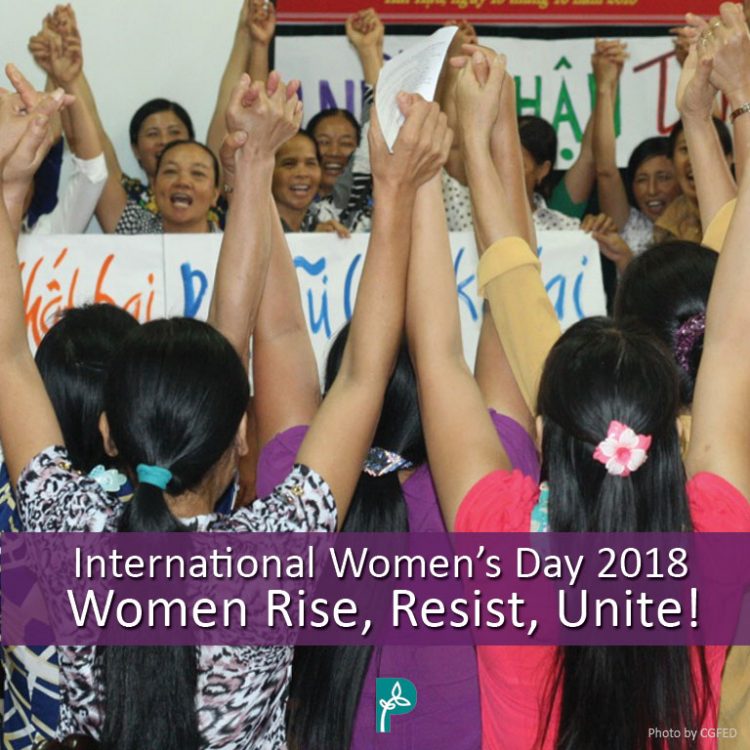On the commemoration of International Women’s Day, regional advocacy group PAN Asia Pacific (PANAP) calls on the toiling women of the world to rise, resist, and unite in the face of attacks on their most basic rights to health, land and freedoms.
In 2016, an investigation on the pesticides use among workers in oil palm plantations in North Sumatra, Indonesia revealed that plantation workers are heavily exposed to toxic pesticides. These includes Highly Hazardous Pesticides (HHPs) paraquat and glyphosate which are restricted in the country. Majority of these plantation workers are women and they suffer from many symptoms of pesticides poisoning.
These are attested by Reena* and Fiona* as they suffered acute poisoning from spraying pesticides. Both sought medical attention from outside, and shouldered the costs themselves, as they did not get any treatment from the plantation clinic. The doctor who examined them confirmed that they were poisoned by pesticides. Reena’s hands were rotting from pesticide exposure while Fiona coughed blood for a week. Reena and Fiona both worked as a sprayer.
“In South and South East Asia, Highly Hazardous Pesticides (HHPs) are still widely used on farms, cotton fields, rice paddies, and mango and oil palm plantations and in floriculture putting women’s health at risks and their lives at great peril. Unfortunately, women farmers and workers alike are often discriminated and do not have equal access to resources, education, training or information.” said Sarojeni Rengam PANAP Executive Director and 2017 Gender Pioneers for a Future Detoxified Awardee.
Rural women, in particular, are vulnerable to further exploitation and oppression, because of their lack of access and control over land and natural resources. Meanwhile, their role in food production exposes them to pesticides such as working in the sprayed fields, during cleaning the spray tanks or when laundering clothes used during pesticide application.
“Women today face great challenges, both old and new. They remain among the world’s poorest and marginalised. Their rights are seriously eroded by threats on their land, livelihood, and way of life – the rise of new global economic powers, the intensified exploitation of their natural resources, the ongoing dispossession and dislocation of peoples, the rise of tyranny, fascism and militarism the world over, among others,” said Rengam.
Rengam further explained that the aggressive expansion and concentration of corporate control over agriculture, is among the main cause of suffering of rural women. The unprecedented massive conversion of agricultural lands, forests, and other resources has resulted in the physical, economic, and socio-cultural displacement, and thus in the further deprivation of already poor and marginalised sectors of society, as well as in the ever increasing food insecurity and lack of food sovereignty of peasants, fisherfolk, indigenous peoples, and rural populations.
“Women bear the brunt of the rural peoples’ growing lack of access and control over land and resources. This is why they are rising against the continuing expansion of industrial agriculture and large-scale land acquisitions. Women from in parts of the globe, from Asia to Africa to Latin America, are resisting the encroachment of their land and livelihood.”
These just assertion of rights to land are met by brunt force. Such is the case of peasant woman leader of Florida “Ka Pong” Sibayan from the Philippines and the chairperson of the Alyansa ng Manggagawang Bukid sa Asyenda Luisita or Alliance of Agricultural Workers in Hacienda Luisita (AMBALA). Hacienda Luisita is a 5,000 hectare disputed land in central Philippines whose history is marred by violence.
Sibayan and her group were holding a protest action to mark 13th anniversary of the Hacienda Luisita massacre last 15 November 2017 when she was arrested by the local police, jailed and was charged with two counts of alleged physical assault and disobedience to persons of authority.
The harassment of Sibayan is not an isolated case. More rural women, leaders and activists alike are being harassed, jailed and persecuted while killings related to land grabbing continue to rise. PANAP’s Land & Rights Watch monitored cases of killings that claimed the lives of 155 individuals, while 19 or 10% were women from January 2017 to February 2018.
The worrying condition of global economic and political landscape further intensify the attacks of the people’s lives and rights. To face such adversities, the struggle for women’s rights should be in line with the struggle for people’s rights. The toiling women should march forward together with fellow oppressed sectors of the society.
“Collective actions and unified resistance from oppressed sectors including women, workers, farmers and indigenous peoples are crucial formula to reclaim people’s rights.” Rengam ended.
###
For more information, please contact Danica Castillo at info@panap.net.
________________
*names have been changed








Discussion about this post